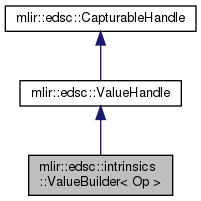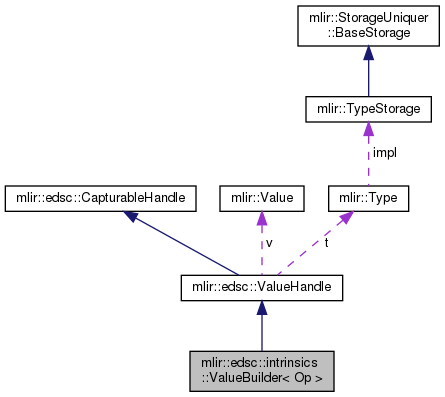#include <Intrinsics.h>
Inheritance diagram for mlir::edsc::intrinsics::ValueBuilder< Op >:

Collaboration diagram for mlir::edsc::intrinsics::ValueBuilder< Op >:

Public Member Functions | |
| template<typename... Args> | |
| ValueBuilder (Args... args) | |
| ValueBuilder (ArrayRef< ValueHandle > vs) | |
| template<typename... Args> | |
| ValueBuilder (ArrayRef< ValueHandle > vs, Args... args) | |
| template<typename T , typename... Args> | |
| ValueBuilder (T t, ArrayRef< ValueHandle > vs, Args... args) | |
| template<typename T1 , typename T2 , typename... Args> | |
| ValueBuilder (T1 t1, T2 t2, ArrayRef< ValueHandle > vs, Args... args) | |
| template<typename... Args> | |
| ValueBuilder (OperationFolder *folder, Args... args) | |
| Folder-based. More... | |
| ValueBuilder (OperationFolder *folder, ArrayRef< ValueHandle > vs) | |
| template<typename... Args> | |
| ValueBuilder (OperationFolder *folder, ArrayRef< ValueHandle > vs, Args... args) | |
| template<typename T , typename... Args> | |
| ValueBuilder (OperationFolder *folder, T t, ArrayRef< ValueHandle > vs, Args... args) | |
| template<typename T1 , typename T2 , typename... Args> | |
| ValueBuilder (OperationFolder *folder, T1 t1, T2 t2, ArrayRef< ValueHandle > vs, Args... args) | |
| ValueBuilder () | |
 Public Member Functions inherited from mlir::edsc::ValueHandle Public Member Functions inherited from mlir::edsc::ValueHandle | |
| ValueHandle (Type t) | |
| ValueHandle (Value v) | |
| ValueHandle (index_t cst) | |
| ValueHandle (const ValueHandle &other)=default | |
| ValueHandle is a value type, use the default copy constructor. More... | |
| ValueHandle & | operator= (const ValueHandle &other) |
| void | swap (ValueHandle &other) |
| Provide a swap operator. More... | |
| operator Value () const | |
| Implicit conversion useful for automatic conversion to Container<Value>. More... | |
| operator bool () const | |
| bool | hasValue () const |
| Value | getValue () const |
| bool | hasType () const |
| Type | getType () const |
| Operation * | getOperation () const |
Additional Inherited Members | |
 Static Public Member Functions inherited from mlir::edsc::ValueHandle Static Public Member Functions inherited from mlir::edsc::ValueHandle | |
| static ValueHandle | null () |
| A ValueHandle in a null state can never be captured;. More... | |
| template<typename Op , typename... Args> | |
| static ValueHandle | create (Args... args) |
| template<typename Op , typename... Args> | |
| static ValueHandle | create (OperationFolder *folder, Args... args) |
| static ValueHandle | createComposedAffineApply (AffineMap map, ArrayRef< Value > operands) |
| Special case to build composed AffineApply operations. More... | |
| static ValueHandle | create (StringRef name, ArrayRef< ValueHandle > operands, ArrayRef< Type > resultTypes, ArrayRef< NamedAttribute > attributes={}) |
| Generic create for a named operation producing a single value. More... | |
 Protected Member Functions inherited from mlir::edsc::ValueHandle Protected Member Functions inherited from mlir::edsc::ValueHandle | |
| ValueHandle () | |
 Protected Member Functions inherited from mlir::edsc::CapturableHandle Protected Member Functions inherited from mlir::edsc::CapturableHandle | |
| CapturableHandle ()=default | |
 Protected Attributes inherited from mlir::edsc::ValueHandle Protected Attributes inherited from mlir::edsc::ValueHandle | |
| Type | t |
| Value | v |
Detailed Description
template<typename Op>
struct mlir::edsc::intrinsics::ValueBuilder< Op >
Helper variadic abstraction to allow extending to any MLIR op without boilerplate or Tablegen. Arguably a builder is not a ValueHandle but in practice it is only used as an alias to a notional ValueHandle<Op>. Implementing it as a subclass allows it to compose all the way to Value. Without subclassing, implicit conversion to Value would fail when composing in patterns such as: select(a, b, select(c, d, e)).
Constructor & Destructor Documentation
◆ ValueBuilder() [1/11]
template<typename Op >
template<typename... Args>
|
inline |
◆ ValueBuilder() [2/11]
template<typename Op >
|
inline |
◆ ValueBuilder() [3/11]
template<typename Op >
template<typename... Args>
|
inline |
◆ ValueBuilder() [4/11]
template<typename Op >
template<typename T , typename... Args>
|
inline |
◆ ValueBuilder() [5/11]
template<typename Op >
template<typename T1 , typename T2 , typename... Args>
|
inline |
◆ ValueBuilder() [6/11]
template<typename Op >
template<typename... Args>
|
inline |
Folder-based.
◆ ValueBuilder() [7/11]
template<typename Op >
|
inline |
◆ ValueBuilder() [8/11]
template<typename Op >
template<typename... Args>
|
inline |
◆ ValueBuilder() [9/11]
template<typename Op >
template<typename T , typename... Args>
|
inline |
◆ ValueBuilder() [10/11]
template<typename Op >
template<typename T1 , typename T2 , typename... Args>
|
inline |
◆ ValueBuilder() [11/11]
template<typename Op >
|
inline |
The documentation for this struct was generated from the following file:
- include/mlir/EDSC/Intrinsics.h
 1.8.13
1.8.13